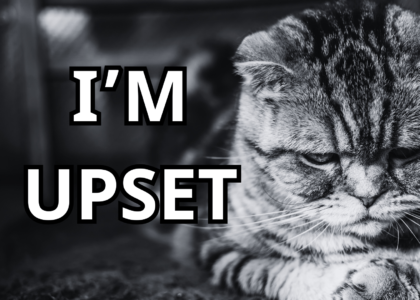You love your cat. You feed them, you pet them, you talk to them like they’re your best friend. But what if I told you that some of the things you do every single day might be driving them absolutely insane? Not just a little annoying, not just mildly inconvenient—genuinely, deep-down, “I am plotting my escape from this household” levels of frustration.
Cats are mysterious creatures. One moment, they’re rubbing up against your leg, purring like they’ve just found the meaning of life. The next, they’re glaring at you from across the room as if you just betrayed them on a personal level. There’s a reason for that.
People tend to think of cats as unpredictable, but the truth is, they have a very clear set of rules—rules that they did not write down, did not explain, and fully expect you to understand anyway. And when you break those rules, well, they notice.
So today, we’re going to uncover the things that secretly drive your cat up the wall. Some of them might seem obvious. Others might make you stop and wonder how your cat has tolerated you for this long. Either way, by the end of this video, you’ll not only understand your cat better, but you might just earn a little more of their respect. Maybe. No promises.
In the human world, eye contact means confidence, connection, maybe even attraction. In the cat world, prolonged eye contact means something very different. A staring contest with a cat isn’t just a casual exchange of glances—it’s a psychological battle. And unless you’re prepared to assert your dominance in a way that may never be forgiven, it’s one you probably shouldn’t start.
Cats communicate a lot through their eyes. A slow blink? That’s a love letter. A half-lidded gaze? That’s contentment. But a hard, unblinking stare? That’s the equivalent of walking up to someone in an alleyway and wordlessly blocking their exit.
If you lock eyes with a cat for too long, they have a decision to make. Will they look away to diffuse the tension? Will they narrow their pupils, preparing for whatever challenge you’ve just issued? Or, worst case scenario, will they charge at your face like you just insulted their entire bloodline?
Even worse is when you’re not staring on purpose. Maybe you’re just daydreaming, lost in thought, not even realizing your gaze has landed directly on your cat. To them, this isn’t passive. This is an interrogation. And when they finally meet your eyes and you don’t immediately look away? Now you’ve made it personal.
The correct way to acknowledge a cat is with a slow blink—half-closed eyes, relaxed face, like you’re about to doze off. This is their version of a friendly handshake. Do it right, and they might even blink back, acknowledging your peaceful intentions. Do it wrong, and you’ve just declared a staring war with a creature that has nothing but time.
People talk to cats the way they talk to newborns, and it’s a mystery why. Maybe it’s the big eyes, the tiny paws, the way they fit perfectly in a little loaf position. Whatever the reason, something about a cat’s presence unlocks a deeply buried instinct in humans to say things like, “Who’s my wittle baby? Who’s the cutest wittle kitty in the whole wide world?”
And while dogs might wag their tails in delight at this nonsense, cats… do not. They do not appreciate the squeaky, high-pitched tone. They do not care about the absurd number of extra vowels you’ve crammed into their name. Mr. Whiskers does not need to be called “Mishter Wibbly Whiskerwoos” at full volume. He just wants you to open the food can and move on with your day.
Cats respond to tone and consistency, not exaggerated affection. A deep, calm voice? That gets their attention. A familiar pattern of words—like their name spoken in a normal, steady tone? That works. But baby talk? To them, that is the sound of someone who has lost control of their vocal cords and possibly their dignity.
It’s not that they hate being spoken to. Some cats love a good conversation. They just prefer it when you talk like a rational human being and not an overexcited grandparent meeting a new grandchild for the first time. Speak clearly, keep your pitch natural, and they might even meow back—on their own terms, of course.
Cats are independent creatures with a strong sense of personal space. They do not believe in forced affection, uninvited touching, or surprise lap placements. In their world, everything operates on consent. And when a human ignores that unspoken rule, they take offense in a way that is both immediate and unforgettable.
You see a cat curled up in a perfect little ball, their fur slightly warm from the sun, their breathing slow and peaceful. You cannot resist. You reach out to pet them, gently, softly—only to be met with a sudden flick of the tail, a twitch of the ears, and a look that says, Did I invite you into this moment?
Cats will tell you when they’ve had enough, and they expect you to listen. Maybe it’s a slight shift in posture. Maybe it’s the gradual stiffening of their body. If you push past these warnings, congratulations—you are now the proud recipient of a swift paw bat or an elegant yet firm departure from your presence.
The same goes for confinement. Try holding a cat against their will, and they will activate every muscle in their body to remove themselves from your grasp. Pick them up when they don’t feel like being picked up, and you’ve just earned a look of betrayal that will be remembered for generations.
The secret to earning a cat’s trust is understanding that affection is a privilege, not a right. Let them come to you. Let them dictate when the interaction begins and when it ends. The less you force it, the more likely they are to grace you with their presence. And in the world of cats, that’s the highest honor there is.
Cats are creatures of habit. They live by an invisible schedule, one they have carefully designed for themselves, and they expect the rest of the household to follow it without question. Breakfast should happen at the exact same time every morning. Nap time should not be interrupted. The litter box should remain in its designated spot for eternity.
Humans, however, are unpredictable. We change things constantly—new work hours, different furniture arrangements, a sudden decision to sleep in on a Saturday. To a cat, these changes are not minor inconveniences. They are acts of chaos.
Move their food bowl a few inches to the left, and suddenly, they’re standing in the kitchen, staring at the floor where it used to be, as if trying to summon it back into existence. Delay their meal by even ten minutes, and you are now the subject of an impatient, judgmental stare that will not waver until the injustice is corrected.
Even bigger changes—like rearranging furniture, introducing a new pet, or switching to a different brand of litter—can feel like a full-scale disruption of their world order. Some cats protest by sulking under the bed. Others pace the house, meowing as if filing a formal complaint. A few will knock something off the counter, just to restore balance.
If you must make changes, do it gradually. Introduce new things slowly. Stick to feeding times as much as possible. And if you’re going to sleep past your cat’s designated breakfast hour, be prepared for a gentle but relentless wake-up call—most likely in the form of a paw pressed firmly to your face.
A cat’s paws and whiskers are not just cute accessories. They are finely tuned survival tools, and when humans start poking, grabbing, or—worst of all—trimming them without permission, cats take it very personally.
Their paws are packed with nerve endings. They use them to feel vibrations, gauge surfaces, and detect the slightest movement. So when a human suddenly decides to grab a paw and hold on like it’s a stress ball, the reaction is swift. A quick pull-away. A sharp look. Maybe even a single, well-placed claw to remind you that some things are off-limits.
And then there are the whiskers—delicate, deeply sensitive, and absolutely essential to their daily lives. Cats use whiskers to measure space, sense movement in the air, and navigate in the dark. Cutting them is like blinding their radar system. Even touching them too much can be irritating. If you’ve ever seen a cat recoil when their whiskers brush against the sides of a food bowl, you’ve witnessed firsthand how much they value their personal sensory equipment.
If you must touch their paws—say, for a nail trim—do it gently, with patience, and preferably with some bribery involved. But whiskers? Just leave them alone. They’re not decorations. They’re an ancient, highly effective tracking system, and your cat would prefer that you respect the technology.
Cats live in a world of whispers. A rustling paper, the softest creak of a floorboard, even the quiet hum of an appliance turning on—these are all things they hear long before you do. Their ears are fine-tuned instruments, designed to pick up the faintest sound of prey in the wild. But in your home, this superpower has one unfortunate side effect: every loud noise is a potential apocalypse.
A dropped spoon? Catastrophic. A vacuum cleaner? An extinction-level event. A single, unexpected sneeze? Pure betrayal.
It’s not just noise, either. Sudden movements can be just as unnerving. You stand up too quickly? They’re gone. You reach down to pet them when they weren’t expecting it? You might as well have materialized out of thin air. A cat’s survival instinct is wired to assume that anything fast and unpredictable is either a predator or a threat—neither of which they plan to stick around and negotiate with.
Some noises, though, are worse than others. Hissing sounds, for example, set off an immediate red flag in their brain. A sudden burst of laughter can send them launching off the couch like they just remembered they left the oven on. Even crinkling aluminum foil can trigger a full-body shudder.
The good news is that cats can adjust to predictable sounds over time. If you always turn on the hairdryer at the same time each morning, they’ll learn to ignore it. But if you suddenly drop a stack of plates while they’re in the middle of a nap? Expect them to vanish into another dimension for at least the next three hours.
If you want a cat to trust you, move deliberately, speak softly, and for the love of all things furry, give them some kind of warning before you turn on the blender.
Cats experience the world through their noses in a way humans can barely comprehend. What we consider a mild scent, they experience as an all-consuming presence. Imagine someone blasting perfume in your face while you’re trying to eat breakfast—that’s how strong certain smells are for them. And unfortunately for us, some of their least favorite scents happen to be the ones we love the most.
Citrus? Absolutely unbearable. A single whiff of an orange peel can send a cat recoiling in horror like they just discovered you’ve been secretly working for the enemy. Vinegar? Unforgivable. Mint? A personal attack. And don’t even get them started on strong floral fragrances. That candle you think smells like a peaceful garden? To your cat, it’s an overwhelming wall of chemical warfare.
But it’s not just about personal preference. Some scents aren’t just offensive—they’re actually dangerous. Essential oils, especially tea tree, eucalyptus, and lavender, can be toxic to cats, even in small amounts. Their livers aren’t built to process certain compounds, which means that your soothing lavender diffuser could be making your cat deeply uncomfortable—or worse, sick.
And then there’s the betrayal of strong-smelling cleaning products. You wipe down a surface with lemon-scented disinfectant, thinking you’re keeping things fresh. Meanwhile, your cat walks into the room and suddenly questions whether they even live here anymore.
If you want to stay on your cat’s good side, keep strong scents to a minimum, especially in areas where they eat, sleep, or lounge. Otherwise, don’t be surprised if they start spending more time in the one room of the house that still smells like them—probably your closet, nestled into your favorite sweater, reclaiming their sense of comfort one fur-covered thread at a time.
Cats may be small, but their opinions are massive. They know what they like, they definitely know what they hate, and they have absolutely no problem letting you know when you’ve crossed the line. The good news? Now that you understand their unspoken rules, you can avoid being the constant source of their silent judgment—or worse, their not-so-silent revenge.






